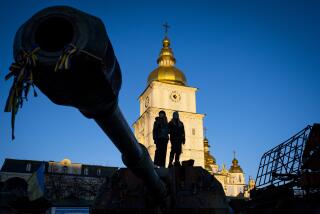Acceptance of Warlord Sends Mixed Signal
- Share via
BELGRADE, Yugoslavia — The crowd that fills the tables at the venerable Writers’ Club restaurant here is accustomed to the politicians, dissidents and intelligentsia who routinely drop by to share a meal and discuss world events.
But one night this week, the room fell silent when in strode the man known as Arkan, one of the most notorious paramilitary warlords in the bloodstained history of Serbia and Serbian Bosnia.
Arkan, dressed in a long, black cashmere coat and flanked by bodyguards in identical garb, joined the editor of Belgrade’s principal newspaper, Politika. The editor, Hadzi Dragan Antic, is a close ally of Serbian President Slobodan Milosevic, the leader upon whom the U.S. government is relying to make the new Balkan peace accord work.
Arkan and Antic kissed amicably in the customary Eastern European greeting and sat down to a fine dinner. Also at their table was a television executive and one of the country’s most prominent businessmen. Around the room were politicians, diplomats and a few journalists, mostly Yugoslavs.
The presence of Arkan, whose real name is Zeljko Raznjatovic and who is wanted by Interpol for a series of armed bank heists in Western Europe, illustrated the coziness that exists here between the criminal elite and mainstream society.
Arkan has sought to become accepted, and to a measure he seems to have succeeded. Earlier on the day of the Writers’ Club dinner, he had attended a Businessman of the Year luncheon.
Moreover, Arkan’s friendly dinner with a close Milosevic ally raises questions about Milosevic’s commitment to controlling war criminals, whose removal from public positions and eventual prosecution is an important component of the peace agreement signed by Milosevic and the presidents of Bosnia-Herzegovina and Croatia.
*
Milosevic has embarked on a persistent campaign to restore Serb-dominated Yugoslavia to the world’s good graces. He is trying to transform his own image from that of nationalist warmonger to respected peace-maker by making broad concessions in peace negotiations and promising to marginalize indicted war criminals, including Bosnian Serb leader Radovan Karadzic and army commander Gen. Ratko Mladic--who, like Arkan, have been accused of atrocities.
For U.S. officials who brokered the agreement that will be formally signed in two weeks, the lingering question has been whether Milosevic can or will follow through.
The signals are contradictory. The day after Arkan was seen dining with Antic, Milosevic purged five people from his Serbian Socialist Party in what was officially portrayed as a move to cleanse the party of nationalistic hard-liners who promoted war.
The removals included the head of the state news agency, Tanjug, and Borisav Jovic, an intimate associate of Milosevic who was at the center of many of the president’s schemes to hold on to power--schemes blamed in part for the violent disintegration of Yugoslavia.
*
Arkan has not been indicted by the U.N. war crimes tribunal at The Hague, but paramilitary units under his command have been accused of some of the most brutal “ethnic cleansing” campaigns of the 43-month war. As recently as late September, shortly before a cease-fire took effect, he and his men rounded up and expelled Muslim villagers from the Sanski Most area of northwest Bosnia, according to survivors.
His appearance with Antic and company at the Writers’ Club “confirms Arkan is very much Establishment,” said one analyst who was present. “It betrays the ‘peace’ promoted by the ‘peace-mongers.’ ”
While Arkan, who has made a fortune through oil speculation and other deals, dines in Belgrade with the head of Milosevic’s mouthpiece newspaper, Karadzic has made daily, unfettered appearances to blast the accord that Milosevic approved.
Still, Western diplomats said they remain confident that Milosevic will remove Karadzic because the full lifting of economic sanctions--the Serbian president’s chief goal--depends on it. But they point to the political pressures at home that may limit the manner and speed with which he sacrifices his onetime protege.
“Milosevic will have a hard time sending Karadzic to The Hague,” a Western diplomat said. “My favorite scenario is having him go into retirement where the television cameras will never find him. Either he’ll go off to some Black Sea resort or live quietly in a house in the Serb part of Bosnia with lots of bodyguards. I don’t see a death scenario. I don’t see him being killed, I see him sidelined.”
In the Writers’ Club, Arkan sat at the head of a corner table, his back to the wall, in the manner of men who know there are many who want to kill them.
Now in his mid-40s, Arkan seems to have put on a bit of weight, and his hair is beginning to thin. His wife of less than a year, a popular singer half his age, accompanied him. He spoke occasionally on a cellular phone, still a rarity in Serbia.
When Arkan arose in a flourish to leave, two American reporters intercepted him and sought his opinion on the peace plan.
“It is not a good plan,” he said, hurriedly. “It will be changed, there will be annexes.
“We are not going to give up Sarajevo,” he added, speaking of the Bosnian capital whose Serb-held suburbs are to be put under Bosnian government control.
Asked about the possible prosecution of alleged war criminals as part of the agreement, he said he was not concerned, suggesting that modern wars rarely see their criminals prosecuted. “I am not afraid,” he said before bounding up the stairs and out of the restaurant.
More to Read
Sign up for Essential California
The most important California stories and recommendations in your inbox every morning.
You may occasionally receive promotional content from the Los Angeles Times.














